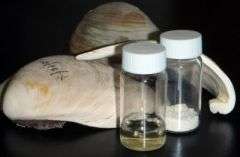These shells don't clam up: Innovative technique to record human impact on coastal waters

With their sedentary lifestyles and filter-feeding habits, clams have been silent witnesses to the changes that humans have inflicted upon their waters. These clams are silent no more, as Dr. Ruth H. Carmichael of the Dauphin Island Sea Lab and her colleagues have reported in their recent paper in Aquatic Biology.
Using stable isotope techniques, Carmichael demonstrated it is possible to identify and trace wastewater inputs to estuaries and coastal food webs by studying the organic matrix in the shell of the hard clam Mercenaria mercenaria.
This work presents a novel application of established biochemical techniques that can be applied to refine diet analyses for shellfish, trace nitrogen entry to coastal waters relative to changes in urbanization or climate, and help discern natural from human-driven influences on coastal ecosystems.
Using this new technique will allow coastal researchers and managers to document increases in waste loadings to coastal waters over longer periods of environmental change.
"This technique is exciting because it gives scientists and coastal managers a way to look into the past and trace human influences, in this case wastewater pollution, into local waters and ultimately into the organisms living there," said Dr. Carmichael. "Tools that help us define and trace specific sources of human-influence on our coastal waters are essential to inform management and future research efforts."
Source: Dauphin Island Sea Lab





















